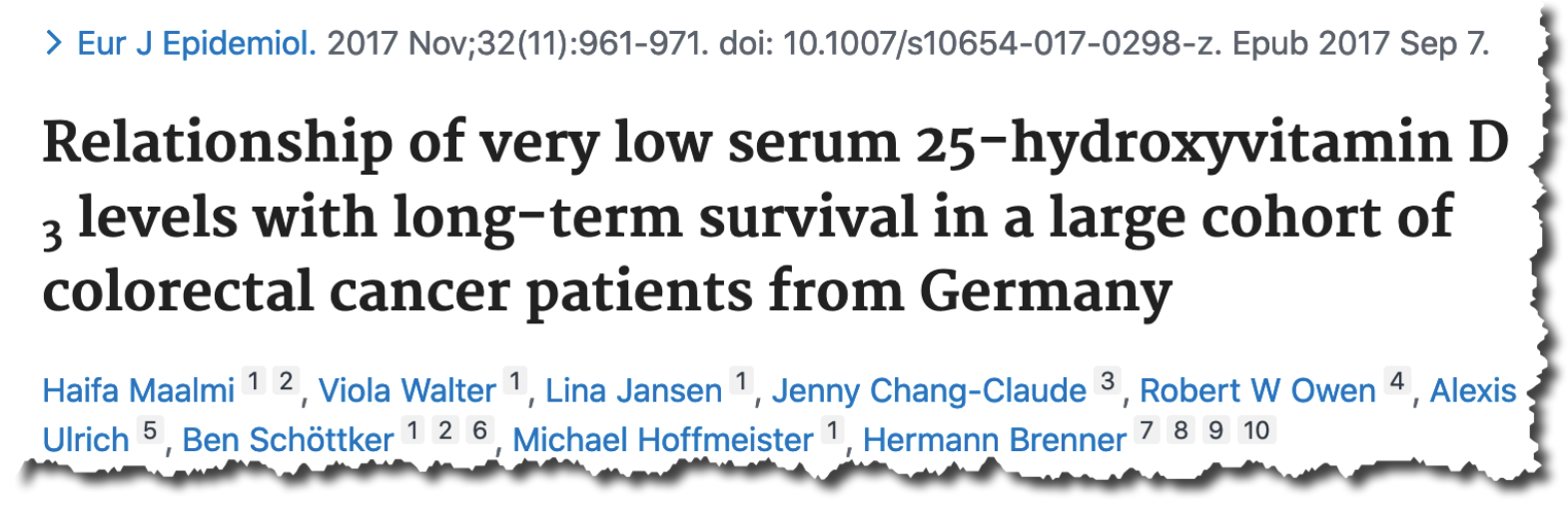
It’s cheap and natural and oh-so-powerful for avoiding the big C

—-Important Message—-
Men: push this weird pressure point to shrink the prostate in 7 seconds
For 5,000 years, the Chinese have kept this prostate trick locked and sealed.
But the TRUTH is finally out.
By pressing this weird pressure point for 7 seconds you can dramatically shrink an inflamed prostate.
But only a few people know where this tricky pressure point is located exactly…
———-
This one vitamin can help prevent colon cancer from ever happening to you
Colon (or colorectal) cancer is a very common occurrence, typically in middle-aged men.
Yearly screenings are now regularly recommended in individuals over 50.
Interestingly enough, there seems to have been a decrease in the colorectal cancer incidence for this age group:
“Between 2000 and 2013, incidence rates in adults aged ≥50 years declined by 32%, with the drop largest for distal tumors in people aged ≥65 years and smallest for rectal tumors in ages 50 to 64 years.” – Siegel et al. (2017)
This is obviously good news, and may be explained by greater emphasis on dietary fiber and other preventive measures to improve digestion.
However, colon cancer is becoming more frequent in younger individuals:
“After decreasing in the previous decade, colon cancer incidence rates increased by 1.0% to 2.4% annually since the mid-1980s in adults age 20 to 39 years and by 0.5% to 1.3% since the mid-1990s in adults age 40 to 54 years; rectal cancer incidence rates have been increasing longer and faster (eg, 3.2% annually from 1974-2013 in adults age 20-29 years).” – Siegel et al. (2017)
Dietary habits, with a lack of insoluble fiber, physical activity, and frequent constipation problems, probably play a role in the pathology of colon cancer, among other factors.
One of these factors, which is now very familiar, is vitamin D.
Vitamin D acts like a hormone, and is involved in countless metabolic functions in the human body.
It has been shown to be protective against virtually everything, so it is no surprise that it should be protective in the case of colon cancer.

A 2017 study investigated the relationship between serum vitamin D levels and colorectal cancer (CRC) survival rates:
“During a median follow-up duration of 4.8 years for overall survival and 3.9 years for recurrence-free survival, a total of 787 deaths occurred, of which 573 were due to CRC, and 817 patients recurred.”
“Patients with the lowest quintile of serum 25(OH)D3 (vitamin D) and those with vitamin D deficiency had much poorer survival than those in the highest quintiles of serum 25(OH)D3 levels.” – Maalmi et al. (2017)
Clearly, lower vitamin D levels are associated with lower survival rates for colorectal cancer.
The authors suggest that vitamin D supplementation should be added to the standard treatment approach.
Vitamin D is not a panacea, and other simple interventions like aspirin have also been shown to be protective for digestive tract cancers.
Nonetheless, it is cheap, easy to implement, and can complement existing treatments, while also being a good preventative measure.
—-Important Message About Supplementing with Vitamin D—-
Your vitamin D supplements won’t work — unless you do this
I’ve discovered one toxic hormone that drains men of vitamin D and other important nutrients…
And unless you do something about this toxic hormone, no amount of vitamin D supplements will help.
Your vitamin D levels will continue to plummet…and other key nutrients will fall lower and lower…
And many men start feeling very tired, with no energy, no stamina, no drive…
And it’s all because of this one toxic hormone that’s working against you.
So before you take your vitamin D supplements, do this first…
It’s called my Golden Ratio protocol and it helps keep important nutrients in the perfect ratio while fighting back against this toxic hormone…
———-

Maalmi H, Walter V, Jansen L, et al. Relationship of very low serum 25-hydroxyvitamin D3 levels with long-term survival in a large cohort of colorectal cancer patients from Germany. Eur J Epidemiol. 2017;32(11):961-971. doi:10.1007/s10654-017-0298-z
https://pubmed.ncbi.nlm.nih.gov/28884317/
Siegel RL, Fedewa SA, Anderson WF, et al. Colorectal Cancer Incidence Patterns in the United States, 1974-2013. J Natl Cancer Inst. 2017;109(8):djw322. doi:10.1093/jnci/djw322
https://pubmed.ncbi.nlm.nih.gov/28376186/
Siegel RL, Miller KD, Fedewa SA, et al. Colorectal cancer statistics, 2017. CA Cancer J Clin. 2017;67(3):177-193. doi:10.3322/caac.21395
